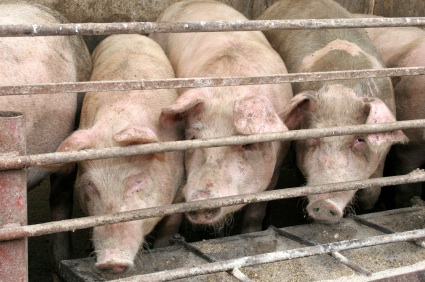On Wednesday, The New York Times ran a terrific, long article — one that reporters had clearly worked on for a long time — on Smithfield Foods’ rapid transformation of hog farming in Eastern Europe.
The article documents how the Virginia-based pork giant has squashed small-scale hog farming in Romania and Poland, just as it did in the United States in the 1990s.
In Romania, the number of hog farmers has declined 90 percent – to 52,100 in 2007 from 477,030 in 2003 – according to European Union statistics, with ex-farmers, overwhelmed by Smithfield’s lower prices, often emigrating or shifting to construction. In their place, the company employs or contracts with about 900 people and buys grain from about 100 farmers.
In Poland, there were 1.1 million hog farmers in 1996. That number fell 56 percent by 2008, as the advent of modern farming methods transformed agriculture, according to the Polish National Agricultural Chamber.
It shows how the company behaved questionably during an outbreak of, ahem, swine flu (a “classic” strain that doesn’t affect humans) in Romania in 2007:
It moved [into Romania] with such speed that sometimes it failed to secure environmental permits or inform the authorities about pig deaths – lapses that emerged after swine fever swept through three Romanian hog compounds in 2007, two of which were operating without permits. Some 67,000 hogs died or were destroyed, with infected and healthy pigs shot to stanch the spread.
And the Times piece reveals how the pork giant used high-level cronyism to move through the maze of the Romanian political system:
In the post-Communist disorder, it is essential to know your way about. In Bucharest, Smithfield turned to Nicholas Taubman, a wealthy Republican businessman who was the U.S. ambassador to Romania during the administration of President George W. Bush. Mr. Taubman escorted Smithfield’s top executives during meetings with the Romanian president and prime minister and president.
“I’m from Virginia and they’re a large corporation and I know them very well,” Mr. Taubman said, noting that he had also helped Ford Motor, which had an easier time in Romania because it had the support of a government minister.
The article shows how Smithfield is managing to grab all manner of subsidies from the EU for, essentially, wiping out the small-farm sector in Poland and Romania. And there are the tales, familiar everywhere that Smithfield alights (Iowa, North Carlina, Vera Cruz, Mexico), of vast open cesspools, unbearable stenches, and wrecked communities. The article ends with a look at how cheap, subsidized Smithfield pork is streaming into Africa, undercutting farmers there and knocking them off the land.
Mr. Yao said that many pig farmers have left, in search of work. Like Romanian ex-farmers combing Europe’s construction sites for work, he is considering becoming an export himself.
Altogether, a tour de force on the real meaning of globalized, unregulated food markets — and an example of what good journalists can do with time and resources.




